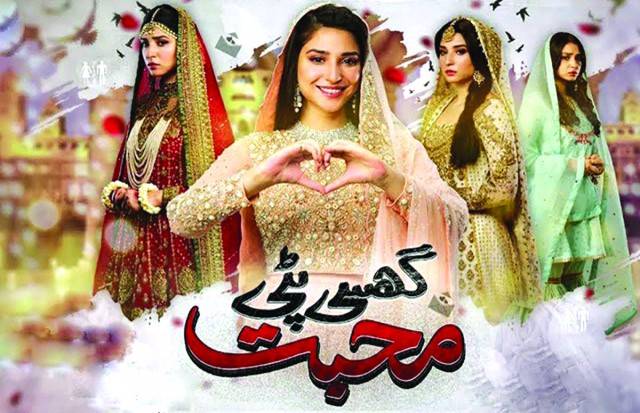
If you’re looking for a good drama to start viewing, your best bet is keep an eye out for what PEMRA plans to ban next. That’s the one to watch.
After the poignant and painfully gripping Udaari, Kashf Foundation has produced another gem. Heartbreaking to the core, Dil Na Umeed Tou Nahin, currently playing on TV ONE and PTV Home, depicts the brutal reality of human trafficking, prostitution and the plight of vulnerable children. According to the Federal Investigation Agency (FIA), human trafficking is the third largest source of organised crime revenue in Pakistan,
Flawlessly directed by Kashif Nisar and sensitively penned by Amna Mufti, DNUTN is a must-watch.
A rare production where I can’t find fault with the direction or script, the actors do justice to their roles as well. Yumna Zaidi is once again brilliant, this time as the caged yet defiant Sumbul. Yasra Rizvi as the ‘resigned to her fate’ (yet seething silently?) Savera continues her spell of impressive performances (Churails, Dunk). The child stars shine in their stellar performances, be it the characters of Allah Rakhi, Jamshed or Naseem Zehra.
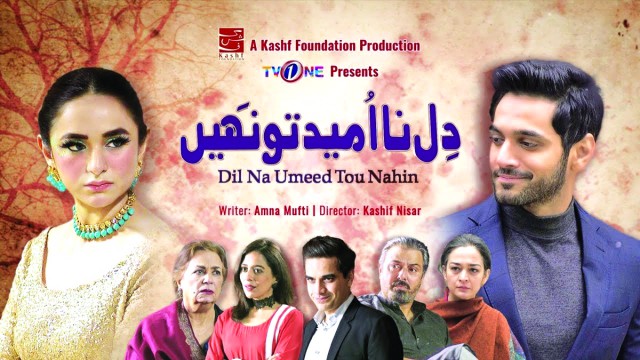
Deeply thought-provoking are Naseem Zehra’s scenes where she wonders why girls should not
run around and play like boys do. The heart does several nose dives as I watch this drama. The scenario of Allah Rakhi as a child bride. Her father’s unceasing tears, her own child-like (for tragically she is still a child) mystification at her ‘rukhsati’. The search for “tomato”, adult Allah Rakhi’s/Sumbul’s ache for escape, parallel to which the story line depicts her child-self and her initial trust in the devious “madam” ruthlessly and masterfully played by Naveed Shehzad.
It’s hard to pause at a particular scene/character and say that THIS is what I want to talk about. There’s so much happening which grips you and moves you tremendously. In other (my kind of) words, there are moments where I felt my heart was crushed in a merciless fist e.g the ‘madam’ smiling treacherously and convincing the tearful Allah Rakhi that her parents would be here by the morning. The little girl blissfully unaware of the dark night stretching ahead. “Lambi hai gham ki shaam...”We are made acutely aware of what we always knew yet it was easier not to dwell on it too much, the extremely sad reality which exists under our noses, child trafficking and forced prostitution.
All credit to Kashf for bringing these causes under the spotlight. Kashf Foundation, working towards empowering women, with the dynamic and compassionate Roshaneh Zafar at the helm, is also responsible for dramas such as Rehai, Aakhri Station and Udaari. They focus on realities which have to be addressed, acknowledged and ferociously fought against.
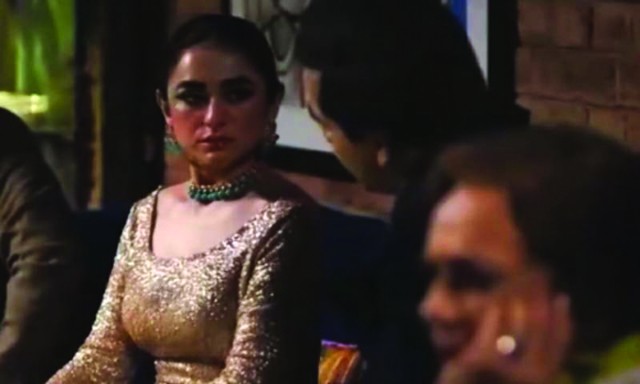
The power of the Pakistani drama can do just that. They can bring the awareness of this menace into our living rooms, into our lives, so at least in some cases, some brave souls will take action. I’m not sure how many people realize the huge grasp of the drama scene on our sensibilities. Both at home and abroad, audiences partial to Pakistani dramas are quite riveted by many of the productions on air right now.
Not all of them are of the same calibre, however and that’s to be expected. It would be good to keep in mind, though, the tremendous outreach that the medium of the ‘Pakistani drama’ has.
Here in Seattle, as a bunch of desi “gals” congregate for a chat over chai, there is always an exuberant exchange of drama recommendations, the women in question may be trail blazers at Amazon or Microsoft or doctors, lawyers or housewives, they still want to discuss Pakistani dramas. As did the house-help in my father’s home in Karachi, and the lovely girl who does my root dye at Mirrors salon.
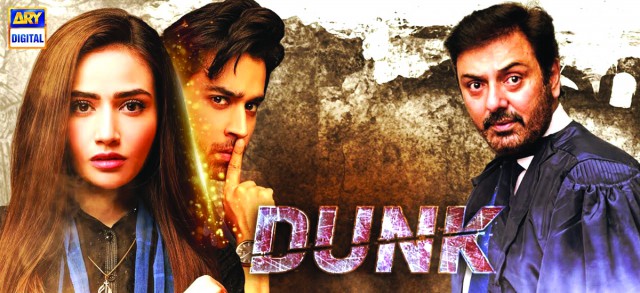
Yes the outreach is tremendous, across the Atlantic, Pacific and Indian oceans, from Seattle to Karachi, from cities to villages. The power of the Pakistani drama is immense.
That is precisely why DNUTN deserves all the critical acclaim it’s getting and that’s why writers,
producers and directors need to be cautious about the products they put out there.
Dunk is another example of sound direction and production but the gist of the told story is
troublesome. The seemingly outraged heroine turns out to be not so pristine after all. This role is played with sinister perfection, by Sana Javed, previously and more often than not seen in roles of the victim/forlorn ‘haseena’ variety. My problem with this portrayal is not that I am unable to digest the idea of an unfairly accused man, I am sure they exist.
In Dunk, Noman Ijaz’s ‘Professor Humayun’ is wrongly accused of assaulting a student. But given the fact that we live in a society where the reverse is more often the norm, where women are terrified of coming forth, for fear of being shamed, being blamed, should we really be shedding light on the “poor, unfairly accused man scenario” and making dramas centered around this?
I find it disturbing, given the reality of the statistics around us. Despite Bilal Abbas’s brilliant acting, I continue to feel uneasy about the premise and the onslaught it will have on a ‘Me Too’ movement that’s already weakening at the knees and about to keel over.
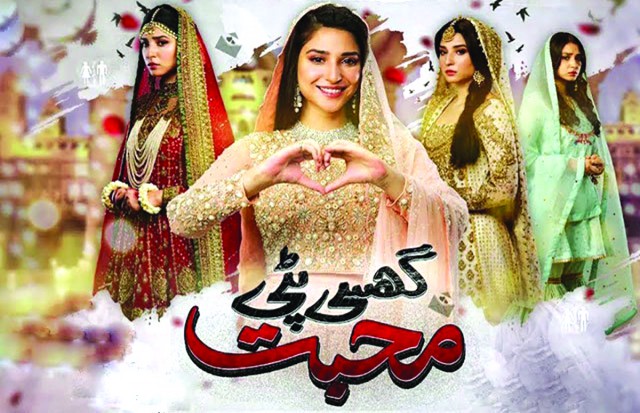
There’s a powerhouse of potential here and while it’s true that not everything needs to be churned out with a deep and dark message, it would really help if at least the wrong messages were not flowing forth.
With reference to Dunk, let’s keep in mind that the ratio of women actually assaulted in real life to those indulging in false accusations is staggering. This is worrying especially as the deft direction and production of the play does manage to keep many hooked.
Also important to agree with those that say that dramas are meant to entertain, Ghissi Pitti Mohabbat (written by Fasih Bari Khan and directed by Ahmad Bhatti) is a great example of a play which did just that but it also effectively bought home several pertinent messages. There’s also the brand of sheer/mere entertainment that has its own particular charm Dolly ki aayegi Baaraat etc), light relief for the senses and almost neccessary, although few and far in between now.
Pakistani dramas today are essentially full of somber notes, tentatively stroking your ‘dhukti rug.’ Thing to remember is that if you’re going to tango with trauma inducing topics, assault, abuse etc then do it carefully, and get it right.
The impact is enormous, the outreach phenomenal. Less sporadic slapping of female characters would help. Stronger, less weepy female leads would also work.
It’s getting better. Nuanced scripts, sensitive direction. More thrillers being churned out, rather than the endless (metaphorically) foaming at the mouth ma-in-law scenarios. The newly started Phaans (written by Samina Aejaz) is a good example of the mystery/thriller genre, as was ‘Cheekh’ (written by Badar Mahmood).
Kashf Foundation has produced DNUTN alongwith UN Women and the National Commission
for the Status of Women. Let’s hope that the painful yet neccessary awaresness which this drama evokes creates some path to change.Let’s hope we move towards to a call to action so that the next Allah Rakhi doesn’t suffer the same heartbreaking brutal fate. Let’s pray for a time when future young ‘Jamsheds’ do not flee villages to fall into the merciless hands of criminal beggar gangs.
A law was passed recently by the National Assembly (tirelessly worked at by musician Shehzad Roy’s Zindagi Trust) that prohibits all forms of corporal punishment. This is a critical step in protecting the rights of the children of Pakistan.
Dil Na Umeed Tou Nahin,
nakkam hi to hai.
Lambi hai gham ki shaam,
magar shaam hi tho hai…
(I haven’t lost hope,
but just a fight, that’s all;
the night of suffering lengthens,
but it is just a night, that’s all.)
(Faiz Ahmad Faiz)
Thanks to initiatives such as this one by Kashf Foundation, let’s hope it is only a night, let’s hope and work towards the light of day-break. If you are going to watch one drama this year, please make it Dil Na Umeed Tou Nahin.
After the poignant and painfully gripping Udaari, Kashf Foundation has produced another gem. Heartbreaking to the core, Dil Na Umeed Tou Nahin, currently playing on TV ONE and PTV Home, depicts the brutal reality of human trafficking, prostitution and the plight of vulnerable children. According to the Federal Investigation Agency (FIA), human trafficking is the third largest source of organised crime revenue in Pakistan,
Flawlessly directed by Kashif Nisar and sensitively penned by Amna Mufti, DNUTN is a must-watch.
A rare production where I can’t find fault with the direction or script, the actors do justice to their roles as well. Yumna Zaidi is once again brilliant, this time as the caged yet defiant Sumbul. Yasra Rizvi as the ‘resigned to her fate’ (yet seething silently?) Savera continues her spell of impressive performances (Churails, Dunk). The child stars shine in their stellar performances, be it the characters of Allah Rakhi, Jamshed or Naseem Zehra.

Deeply thought-provoking are Naseem Zehra’s scenes where she wonders why girls should not
run around and play like boys do. The heart does several nose dives as I watch this drama. The scenario of Allah Rakhi as a child bride. Her father’s unceasing tears, her own child-like (for tragically she is still a child) mystification at her ‘rukhsati’. The search for “tomato”, adult Allah Rakhi’s/Sumbul’s ache for escape, parallel to which the story line depicts her child-self and her initial trust in the devious “madam” ruthlessly and masterfully played by Naveed Shehzad.
It’s hard to pause at a particular scene/character and say that THIS is what I want to talk about. There’s so much happening which grips you and moves you tremendously. In other (my kind of) words, there are moments where I felt my heart was crushed in a merciless fist e.g the ‘madam’ smiling treacherously and convincing the tearful Allah Rakhi that her parents would be here by the morning. The little girl blissfully unaware of the dark night stretching ahead. “Lambi hai gham ki shaam...”We are made acutely aware of what we always knew yet it was easier not to dwell on it too much, the extremely sad reality which exists under our noses, child trafficking and forced prostitution.
All credit to Kashf for bringing these causes under the spotlight. Kashf Foundation, working towards empowering women, with the dynamic and compassionate Roshaneh Zafar at the helm, is also responsible for dramas such as Rehai, Aakhri Station and Udaari. They focus on realities which have to be addressed, acknowledged and ferociously fought against.

The power of the Pakistani drama can do just that. They can bring the awareness of this menace into our living rooms, into our lives, so at least in some cases, some brave souls will take action. I’m not sure how many people realize the huge grasp of the drama scene on our sensibilities. Both at home and abroad, audiences partial to Pakistani dramas are quite riveted by many of the productions on air right now.
Not all of them are of the same calibre, however and that’s to be expected. It would be good to keep in mind, though, the tremendous outreach that the medium of the ‘Pakistani drama’ has.
It’s hard to pause at a particular scene/character and say that THIS is what I want to talk about. There’s so much happening which grips you and moves you tremendously
Here in Seattle, as a bunch of desi “gals” congregate for a chat over chai, there is always an exuberant exchange of drama recommendations, the women in question may be trail blazers at Amazon or Microsoft or doctors, lawyers or housewives, they still want to discuss Pakistani dramas. As did the house-help in my father’s home in Karachi, and the lovely girl who does my root dye at Mirrors salon.

Yes the outreach is tremendous, across the Atlantic, Pacific and Indian oceans, from Seattle to Karachi, from cities to villages. The power of the Pakistani drama is immense.
That is precisely why DNUTN deserves all the critical acclaim it’s getting and that’s why writers,
producers and directors need to be cautious about the products they put out there.
Dunk is another example of sound direction and production but the gist of the told story is
troublesome. The seemingly outraged heroine turns out to be not so pristine after all. This role is played with sinister perfection, by Sana Javed, previously and more often than not seen in roles of the victim/forlorn ‘haseena’ variety. My problem with this portrayal is not that I am unable to digest the idea of an unfairly accused man, I am sure they exist.
In Dunk, Noman Ijaz’s ‘Professor Humayun’ is wrongly accused of assaulting a student. But given the fact that we live in a society where the reverse is more often the norm, where women are terrified of coming forth, for fear of being shamed, being blamed, should we really be shedding light on the “poor, unfairly accused man scenario” and making dramas centered around this?
I find it disturbing, given the reality of the statistics around us. Despite Bilal Abbas’s brilliant acting, I continue to feel uneasy about the premise and the onslaught it will have on a ‘Me Too’ movement that’s already weakening at the knees and about to keel over.

There’s a powerhouse of potential here and while it’s true that not everything needs to be churned out with a deep and dark message, it would really help if at least the wrong messages were not flowing forth.
With reference to Dunk, let’s keep in mind that the ratio of women actually assaulted in real life to those indulging in false accusations is staggering. This is worrying especially as the deft direction and production of the play does manage to keep many hooked.
Also important to agree with those that say that dramas are meant to entertain, Ghissi Pitti Mohabbat (written by Fasih Bari Khan and directed by Ahmad Bhatti) is a great example of a play which did just that but it also effectively bought home several pertinent messages. There’s also the brand of sheer/mere entertainment that has its own particular charm Dolly ki aayegi Baaraat etc), light relief for the senses and almost neccessary, although few and far in between now.
Pakistani dramas today are essentially full of somber notes, tentatively stroking your ‘dhukti rug.’ Thing to remember is that if you’re going to tango with trauma inducing topics, assault, abuse etc then do it carefully, and get it right.
I’m not sure how many people realize the huge grasp of the drama scene on our sensibilities. Both at home and abroad, audiences partial to Pakistani dramas are quite riveted by many of the productions on air right now
The impact is enormous, the outreach phenomenal. Less sporadic slapping of female characters would help. Stronger, less weepy female leads would also work.
It’s getting better. Nuanced scripts, sensitive direction. More thrillers being churned out, rather than the endless (metaphorically) foaming at the mouth ma-in-law scenarios. The newly started Phaans (written by Samina Aejaz) is a good example of the mystery/thriller genre, as was ‘Cheekh’ (written by Badar Mahmood).
Kashf Foundation has produced DNUTN alongwith UN Women and the National Commission
for the Status of Women. Let’s hope that the painful yet neccessary awaresness which this drama evokes creates some path to change.Let’s hope we move towards to a call to action so that the next Allah Rakhi doesn’t suffer the same heartbreaking brutal fate. Let’s pray for a time when future young ‘Jamsheds’ do not flee villages to fall into the merciless hands of criminal beggar gangs.
A law was passed recently by the National Assembly (tirelessly worked at by musician Shehzad Roy’s Zindagi Trust) that prohibits all forms of corporal punishment. This is a critical step in protecting the rights of the children of Pakistan.
Dil Na Umeed Tou Nahin,
nakkam hi to hai.
Lambi hai gham ki shaam,
magar shaam hi tho hai…
(I haven’t lost hope,
but just a fight, that’s all;
the night of suffering lengthens,
but it is just a night, that’s all.)
(Faiz Ahmad Faiz)
Thanks to initiatives such as this one by Kashf Foundation, let’s hope it is only a night, let’s hope and work towards the light of day-break. If you are going to watch one drama this year, please make it Dil Na Umeed Tou Nahin.

